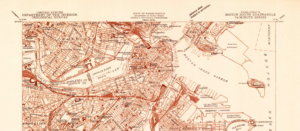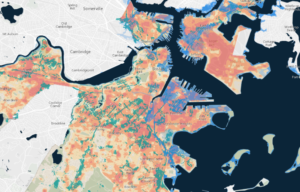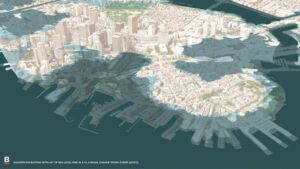Boston has an interesting history with the environment, as not long ago the majority of the city was underwater. Due to continued climate change and environmental disasters, it will more than likely flood and many areas across the globe will be affected forever. This thematic tour will begin in the Muddy River Floodplain as it has both historical and modern roots, and is an example of a direct attempt to prevent the catastrophe that Boston will face within the next 10-20 years. Every point in the relational landscape is relevant as they all have certain inevitable impacts that will occur with the changing environment. What I mean by this is that nearly everything was underwater, and the majority will go underwater in the near future. This will not only affect the Boston city landscape but it will change the social future forever. Boston is historically a city with racist undertones, in both social situations and in the physical landscape in terms of redlining and segregation. One of the focuses of this presentation is the flooding that certain areas of the city will have compared to others. For example, this tour will pass through the community of Roxbury, and compare historic maps to future flooding maps. Roxbury is a neighborhood with an interesting history, and by comparing its flood patterns to other regions such as the northern area by the Charles River Esplanade there is a clear connection between the past and the future. Maps can be used to compare every aspect of Boston, whether that means historically racist redlining maps, or modern flood prediction maps. Throughout this tour, it should be clear that injustices in Boston are nowhere near over, as the subsequent presentation demonstrates how this will disproportionately impact lower income areas. Not only do these people have the disadvantage of less flood-protection, they also will not have the funds in many cases to move out of the areas before the impacts get bad, or they will fall into the trap of cheap housing right before the flooding occurs. Overall, climate justice is a very real and important issue that will occur in our very city. The environment has always had dramatic effects on people. The tour will also cover the future of air pollution and temperature increase in the city of Boston for each of the locations specified, although these are harder to predict than the flooding due to irregularities in emissions. A lot of this tour will be looking at the extreme perspective, looking at the climate change situation as it looks like now. Hopefully by the time these issues are actually becoming reality climate initiatives have dramatically prevented carbon emissions worldwide, but regardless Boston will face environmental change. Focusing primarily on how this will affect people of different statuses and races, the tour goes into depth on both public parks and spaces that will see a huge environmental shift, such as the Boston Common, the Charles River Esplanade, North Point Park (Island), Jamaica Pond, and the Arnold Arboretum, as well as neighborhoods, specifically low income communities, that will see the most drastic change. A lot of the Emerald necklace was designed as a flood plain, such as the muddy river, the Fens, and Jamaica Plain. On the tour, you will see how successful some of the floodplains have been, or are predicted to be. So far, plains like the Muddy River have been successful for the most part. The Emerald Necklace was added to Boston in 1896, so some of the map will be comparing the before and after to thoroughly research the communities that surround it and how climate change will play a role in the future. While the flooding role might seem redundant, the sources show how the ocean is predicted on average to rise a minimum of 8 inches within the next 10 years. This is why projects such as the Muddy River Flood Mitigation Project both tie into the community but also are detrimental for the survival of habitats. All of Boston will be affected by the weather patterns and the sea level rising, but it is very relevant to focus into climatic justice/environmental justice and how climate change is an ethical and political issue. This ties into many of the in class activities and discussions, as in order to end racism implicit anti-racism and acknowledgement of the past is necessary. By thinking more deeply about environmental factors, we can be more aware of inequity in housing quality and land quality. Just as we were reading about in some of the articles, the environment and landscape people grow up in shape them and how they see the world, so details down to the amount of trees and public spaces are extremely relevant. Scattered along the sites there is also info on the Boston New Green Deal and the salt shipments, as well as one of the focuses being on the displacement of people when the flooding does occur, as reports assume that even after 5 feet of sea level rise (which is half of what is expected overall) the entire Charles River Esplanade as well as the majority of the Emerald Necklace and assorted communities along it will be completely underwater. By looking at the city of Boston and its many relational cites, we can fully prepare for the future here and plan the best method to further equity in the process of preventing property destruction.
- https://ramboll.com/-/media/files/rgr/lcl/bgi_final-report_mit_boston_20160403.pdf?la=en#:~:text=The%20Emerald%20Necklace%20consists%20of,well%2Ddocumented%20in%20public%20archives (Links to an external site.)
- https://www.wbur.org/cognoscenti/2019/09/18/environmental-justice-boston-climate-resiliency-roseann-bongiovanni-john-walkey (Links to an external site.)
- https://www.wbur.org/news/2017/07/26/environmental-justice-boston-chelsea (Links to an external site.)
- https://assets.ctfassets.net/1hf11j69ure4/B6NLxlOVxTVMNbHEvFaQE/700f4762bae92990f91327a7e01e2f09/Boston-Green-New-Deal-August-2020-FINAL.pdf (Links to an external site.)
- http://www.kanarinka.com/project/boston-coastline-future-past/ (Links to an external site.)
- https://thegroundtruthproject.org/climate-change-cities-underwater/#1bostonwaterfront (Links to an external site.)
- https://www.bostonglobe.com/2020/08/23/metro/alleging-environmental-racism-residents-protest-plan-remove-scores-mature-trees-roxbury/ (Links to an external site.)
- https://www.boston.gov/sites/default/files/file/2020/10/Final_North%20End%20Downtown%20Final_EMBARGO.pdf (Links to an external site.)
- https://archivesspace.library.northeastern.edu/repositories/2/archival_objects/366597 (Links to an external site.)
- https://www.cityofboston.gov/parks/pdfs/os7amaps4.pdf (Links to an external site.)
- https://livingatlas.arcgis.com/topoexplorer/index.html (Links to an external site.)


